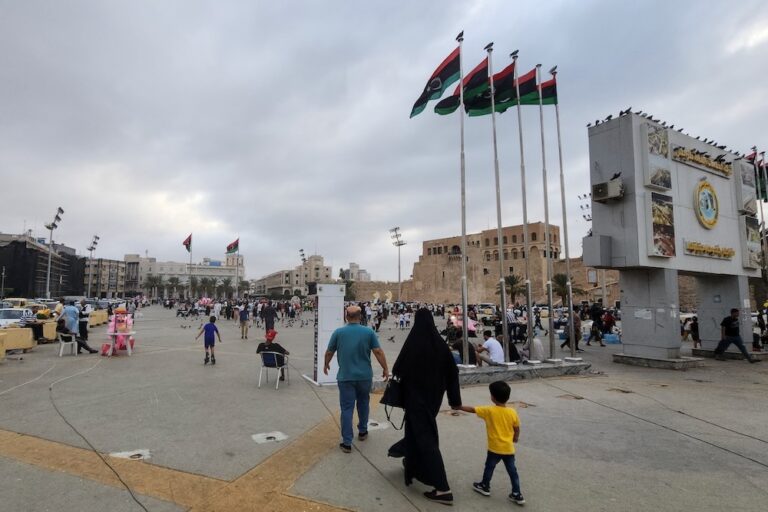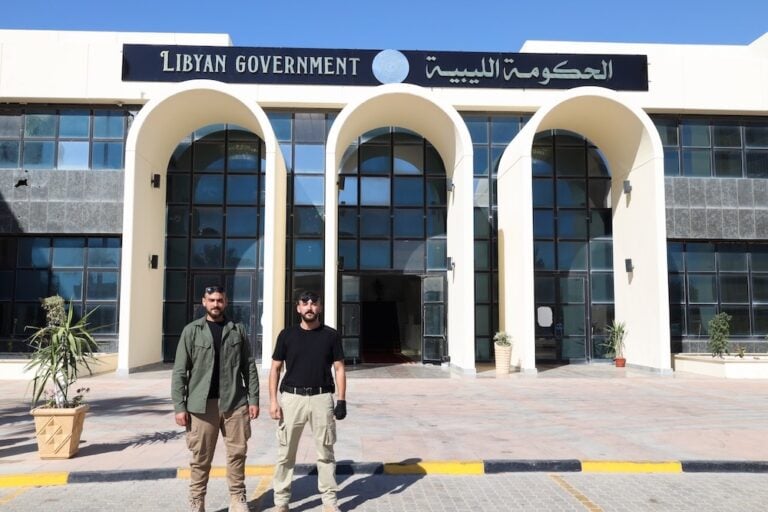Libya’s journalists are still among the leading victims of the political turmoil and violence that have been a constant ever since Col. Gaddafi’s overthrow in the 2011 revolution.
This article was originally published on rsf.org on 14 October 2014.
Libya’s journalists are still among the leading victims of the political turmoil and violence that have been a constant ever since Col. Gaddafi’s overthrow in the 2011 revolution. Armed clashes are continuing despite an attempt by the United Nations Support Mission in Libya (UNSMIL) to broker a ceasefire and talks between the various political players and armed factions two weeks ago in the remote town of Ghadames.
Reporters Without Borders condemns the murder of Al-Tayeb Issa, one of the founders of privately-owned satellite TV station Tuareg Tumsat, in southwestern Libya on 5 October and radio presenter Motassem Al-Warfalli’s murder three days later in the eastern city of Benghazi.
Issa’s bullet-riddled body was found on the road between Ghat and Obari, where he was from. His car had been set on fire. A colleague said that Issa, who was the TV station’s financial director, was a respected and discreet person who had never received threats.
Obari has seen armed clashes between members of the Tebu and Tuareg communities since mid-September. They began when Tuaregs, who reportedly came from another region and support the armed Islamist coalition known as Operation Libya Dawn, tried to take over Obari’s main gas station, until then protected by a local Tebu force.
Warfalli, a young presenter on Radio Sawt Libya Al-Watan, was murdered by gunmen who fired on him from a car and then sped away. He was known as a supporter of Ansar Al-Sharia, a group regarded as a terrorist organization by the Libyan government and the United States.
Although the motives for these murders are still unknown, Reporters Without Borders does not rule out the possibility that they were linked to the victims’ journalistic work and urges the Libyan authorities to carry out swift investigations that take account of this possibility.
This duty was stressed in the UN Human Rights Council’s resolution of 22 September on the “Safety of journalists“.
It urged Libya, like other countries, to conduct “impartial, speedy, thorough, independent and effective investigations into all alleged violence against journalists and media workers falling within their jurisdiction, to bring perpetrators including, inter alia, those who command, conspire to commit, aid and abet or cover up such crimes to justice, and to ensure that victims and their families have access to appropriate remedies.”
Reporters Without Borders reiterates its deep concern about the fate of Libya’s journalists, who are finding it increasingly difficult to practice their profession without fear of being persecuted, attacked or murdered.
Media still being targeted
An armed group attacked Al-Midan FM, a privately-owned radio station in Zawiya, a town 40 km west of Tripoli, on the night of 9 October, removing its transmitter, other equipment and material and badly damaging some of its installations. The station had continued to broadcast political and social programmes despite getting many threats.
In a statement on its Facebook page, the station accused those behind the “terrorist and cowardly attack” of wanting to “silence free media and take them over.” No group has so far claimed responsibility.
Mo’az Al-Thaleeb, a presenter on the privately-owned satellite TV station Al-Assima, was kidnapped in the central Tripoli district of Salah El-Din on the evening of 10 October and was held for two days before being release.
A member of the family said he was held at Al-Yarmouk military camp, which is controlled by Tripoli-based revolutionary militias and by Operation Libya Dawn. Al-Thaleeb, who is also studying social sciences, had previously received threats in connection with his journalistic work.
In recent months, several radio stations have stopped broadcasting certain programmes, especially political ones, or have stopped broadcasting altogether. Many newspapers, such as Al-Mayadeen in Tripoli and Al-Ahwal in Benghazi, have also stopped publishing for fear of being attacked by armed groups.
Such decisions by news media to censor themselves or stop working reinforce the feeling of fear within the media throughout Libya. The increasing frequency with which journalists flee the country after threats, attacks or murder attempts also highlights the level of danger for those who continue to work at great risk to themselves.
Reporters Without Borders reiterates the fundamental importance of freedom of information in any democratic society, especially one in transition such as Libya.
Despite rampant political instability and violence, it is vital that all political and military actors should respect this freedom, one enshrined in article 14 of Libya’s Constitutional Declaration, in the International Covenant on Civil and Political Rights and in other treaties and conventions to which Libya is a party.
Libya’s media personnel must also respect the basic principles of journalistic ethics and conduct by covering events as professionally and impartially as possible, with a constant concern for independence, transparency and objectivity, the bases of good journalism.


